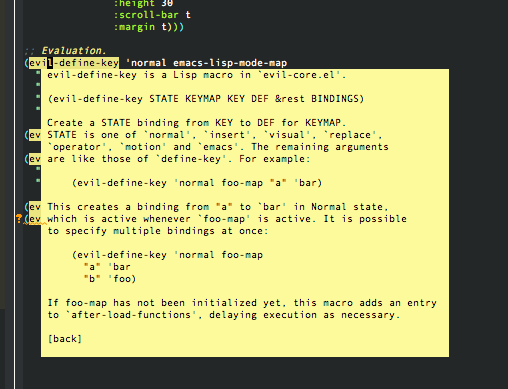Popup Help In Emacs Lisp
If you use Clojure & Emacs, you probably use ac-nrepl-popup-doc to get
the docs for the thing under the point, in a temporary popup
window. And if you write any Elisp, you might be hankering for the
same thing for Emacs’ docs.
Here’s some code that displays the same text as describe-function, but
in a popup overlay:
(require 'popup)
(defun describe-function-in-popup ()
(interactive)
(let* ((thing (symbol-at-point))
(description (save-window-excursion
(describe-function thing)
(switch-to-buffer "*Help*")
(buffer-string))))
(popup-tip description
:point (point)
:around t
:height 30
:scroll-bar t
:margin t)))This code is actually fairly simple, so let’s break it down:
symbol-at-point picks up the thing under the cursor, which should be
the function you’re hovering over.
The shenannigens inside save-window-excursion is just opening the
regular describe-function window, snarfing its contents, and then
closing it immediately. That puts the help text in description.
Then we just call popup-tip to display it. Here’s a screenshot:

You’ll probably want to set up your own favourite keybinding, but
here’s one example, binding it to M-5:
(global-set-key (kbd "M-5") 'describe-function-in-popup)Update
Thanks to a comment from Steve Purcell, we can refine this to work for
variables & faces, not just functions. The big change here is that we
replace describe-function with help-xref-interned.
(defun describe-thing-in-popup ()
(interactive)
(let* ((thing (symbol-at-point))
(help-xref-following t)
(description (with-temp-buffer
(help-mode)
(help-xref-interned thing)
(buffer-string))))
(popup-tip description
:point (point)
:around t
:height 30
:scroll-bar t
:margin t)))One of the nice things about this change is that help-xref lets us
supply our own temporary buffer, instead of re-using *Help*. That
means we don’t clobber anything that’s currently in your help buffer.
To take advantage of that, we just need to set help-xref-following to
t, and put the temp buffer in help-mode.